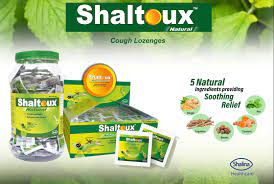Shaltoux Lozenges Composition, Use, Dose, Side Effect
Shaltoux natural cough lozenges are a sweet that relieve cough and sore throat symptoms. It is made from natural ingredients. It is manufactured in India by Shalina Laboratories Pvt Ltd.
 |
| Shaltoux lozenges |
Composition Shaltoux Lozenges
Each Lozenge contains:
Glycyrrhiza glabra 20mg
Terminalia belerica 5mg
Zingiber officinale 5mg
Curcuma longa 2mg
Mentha piperita 7mg
Sugar base q.s, with a Ginger Mint flavor.
Color: Sunset Yellow.
Excipients - Liquid Glucose, Citric Acid Anhydrous, Methyl Paraben, PropylParaben, Purified Water
Pharmacological Category
Shaltoux natural cough lozenges has an expectorant, mucolytic, demulcent and anti-inflammatory action. Shaltoux natural cough lozenges soothes and reduces inflammation of the mucosa of the respiratory tract.
Pharmacological Action
Glycyrrhiza glabra in Shaltoux natural cough lozenges has mucolytic and expectorant properties. Terminalia belerica is an antitussive agent, whereas Zingiber officinale and Curcuma longa acts as antiseptic, anti-inflammatory and demulcent agent.
Therapeutic Indications
• Sore Throat
• Cough of allergic, infective and asthmatic origin.
• Cough caused by industrial dust.
• Cough caused due to smoking.
• Inflammatory painful throat related conditions.
Read Also: Treatment of cough and cold
Contraindications
None have been reported.
Dosage And Method of Administration Of Shaltoux Lozenges
Children and adults: 1-2 lozenges, 3-4 times a day. Dissolve the lozenge slowly in the mouth, do not swallow whole or chew. If symptoms persist, consult your medical doctor.
Adverse Reaction
None have been reported.
Warnings And Precautions
For use in a special population
Usage In Pregnancy And Lactation
As directed by the Physician.
Can Pregnant Women Use Shaltoux Lozenges
Effects On Ability To Drive And Operate Machinery
Not Applicable.
Drug Interactions
None have been reported.

Comments
Post a Comment
Please have your say